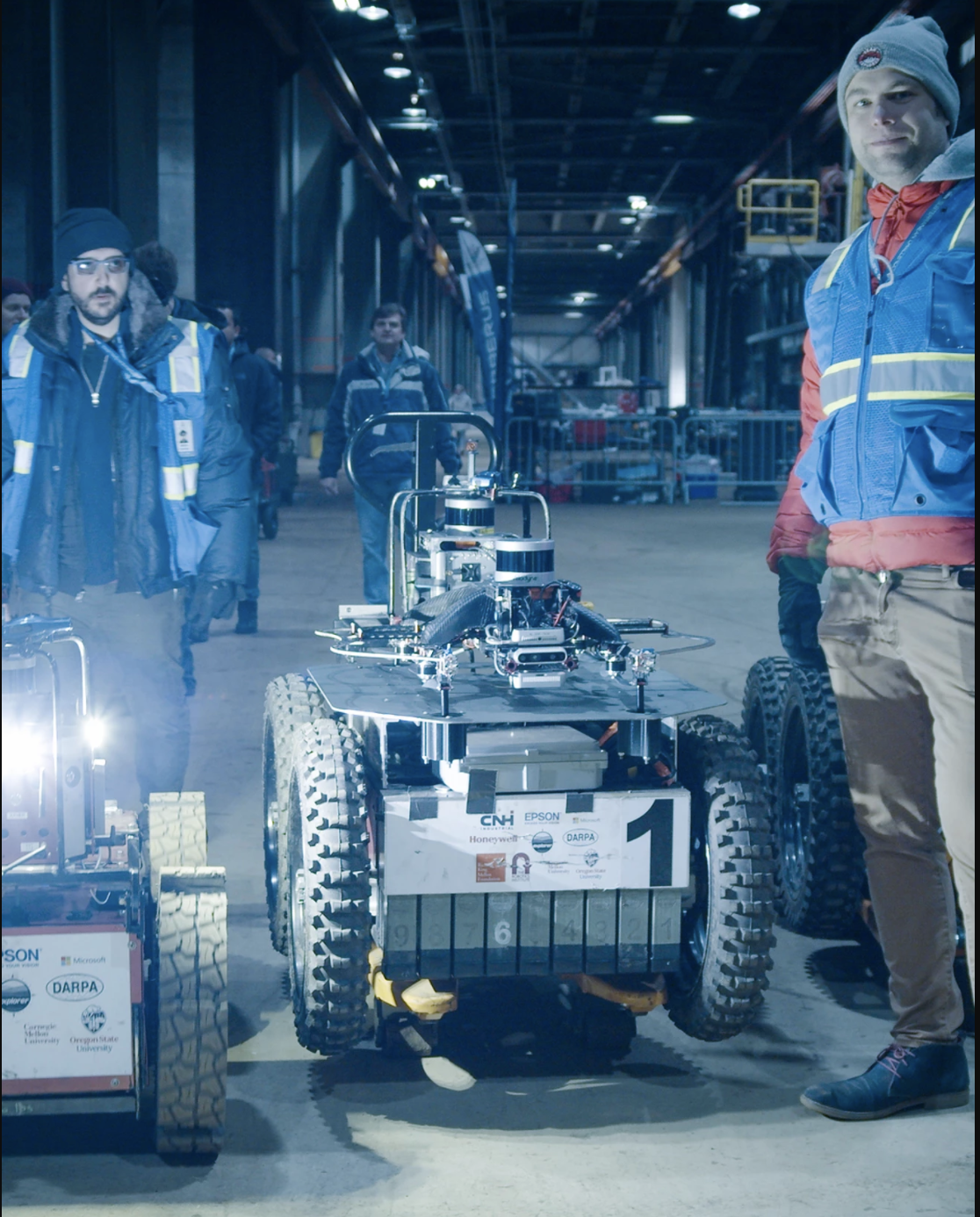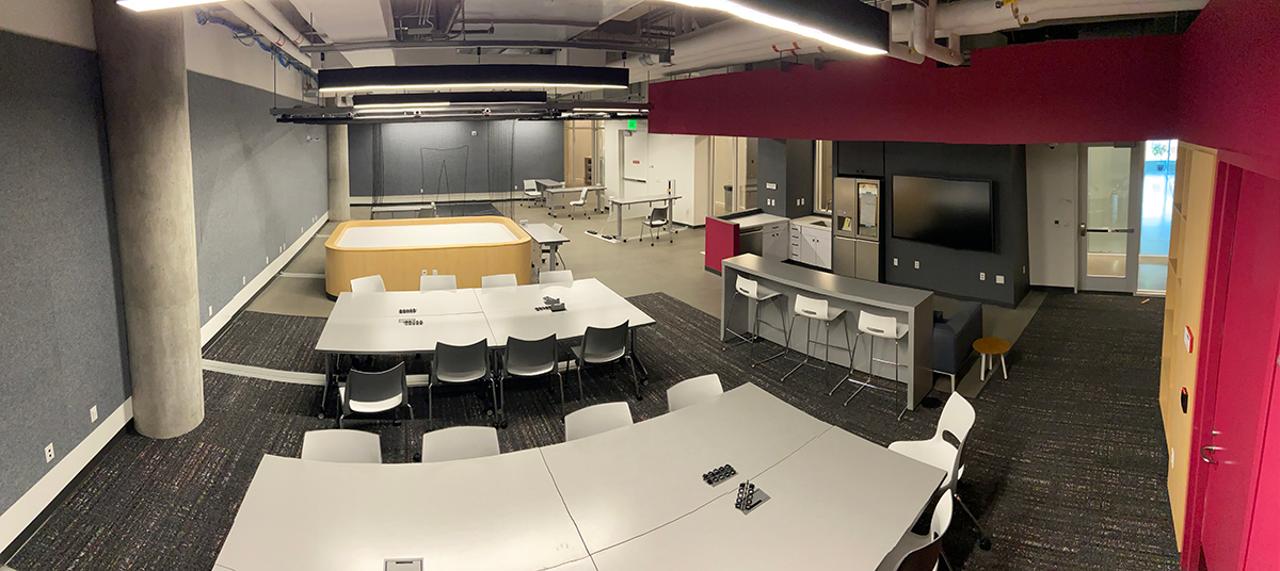Partnerships Initiatives
Carnegie Mellon’s School of Computer Science (SCS) leads the world in innovative thinking and game-changing collaborations. By leveraging these signature strengths across all fields of computer science — including AI, machine learning, robotics, computational biology and more — SCS creates exciting opportunities for advances across a wide array of research areas.
A few of these research initiatives are presented below. Contact us to learn more.
 Solutions to immensely complex and complicated problems in the healthcare industry are becoming more and more attainable as advances in machine learning, robotics, computer vision and computational biology emerge.
Solutions to immensely complex and complicated problems in the healthcare industry are becoming more and more attainable as advances in machine learning, robotics, computer vision and computational biology emerge.
Researchers at CMU and in SCS diligently apply key technologies and critical insights to healthcare issues, from immediate-care scenarios and medical-data systems to advanced genomic testing and the development of antiviral and antibacterial compounds.
We will work with both new and existing partners to build an AI for Healthcare Roadmap, mapping your interests to innovative pursuits in SCS and more widely across CMU.
 AI for Policymakers began in spring 2017, with an expert panel discussion in the Rayburn House Office Building on Capitol Hill, as a way to build a bridge between the policymaking community and leading AI researchers from CMU and around the world. The discussions bring together policymakers, researchers and industry leaders to discuss open issues and questions related to AI, offer perspectives, and connect communities to address real-world challenges.
AI for Policymakers began in spring 2017, with an expert panel discussion in the Rayburn House Office Building on Capitol Hill, as a way to build a bridge between the policymaking community and leading AI researchers from CMU and around the world. The discussions bring together policymakers, researchers and industry leaders to discuss open issues and questions related to AI, offer perspectives, and connect communities to address real-world challenges.
The pace of innovation in artificial intelligence (AI) is unprecedented, and it continues to accelerate year after year. With research and advances in key technologies such as machine learning, computational game theory and autonomy, today’s AI can augment human capability and increase productivity and efficiency for critical tasks that just two years ago would have been impossible. For the Department of Defense and the intelligence community, this innovation will significantly enhance situational awareness and decision-making by fusing information from systems and sensors across multiple domains — from the enterprise to the edge of the battlefield — to maximize mission effectiveness, reduce risk and save lives. We call this innovation AI Fusion.
To learn more about how AI Fusion is accelerating the development of distributed AI, read our paper, AI Fusion: Enabling Distributed Artificial Intelligence To Enhance Multi-Domain Operations and Real-time Situational Awareness (PDF).
 A robust pipeline of talented high school students trained in computer science would make a powerful impact on a wide array of industries. However, world-class computer science education is not available to many high school students interested in the field.
A robust pipeline of talented high school students trained in computer science would make a powerful impact on a wide array of industries. However, world-class computer science education is not available to many high school students interested in the field.
Fortunately, we have the solution, Carnegie Mellon University CS Academy. CMU CS Academy offers a high-quality computer science curriculum for middle and high school students everywhere. We aim to create an entirely free, universally accessible, online, interactive high school computer science curriculum designed and managed by our undergraduate students. In addition to the curriculum framework, we offer teacher training, an online interactive textbook and online technical support from our undergraduate computer science students, available 24/7.
CMU CS Academy offers a quick on-ramp for all instructors who want to teach computer science, including those without any formal training. Teachers can attend free professional development sessions taught by a certified CMU CS Academy trainer and leave ready to use the curriculum in their classrooms.
 The Center for Digital Health Innovation (CDHI) is based in the School of Computer Science at CMU. More than 35 renowned scientists from CMU are actively affiliated with this center, with representation from faculty across campus.
The Center for Digital Health Innovation (CDHI) is based in the School of Computer Science at CMU. More than 35 renowned scientists from CMU are actively affiliated with this center, with representation from faculty across campus.
We are looking for corporate partners to develop research themes and inform new digital healthcare technologies. If you are interested in learning more, contact the Partnerships Team.
 The overarching goal of the IDeaS Center is to enhance social cybersecurity to preserve and support an informed democratic society. The challenge today is that disinformation, hate speech, information warfare and propaganda are amplified by cybertechnology like social media. We must remain informed, thoughtful members of our communities and countries, despite online and informational challenges.
The overarching goal of the IDeaS Center is to enhance social cybersecurity to preserve and support an informed democratic society. The challenge today is that disinformation, hate speech, information warfare and propaganda are amplified by cybertechnology like social media. We must remain informed, thoughtful members of our communities and countries, despite online and informational challenges.
 The DARPA Subterranean (SubT) Challenge seeks novel approaches to rapidly map, navigate and search underground environments during time-sensitive combat operations or disaster response scenarios. Our mission is to seamlessly provide any decisionmaker with the information necessary to make coordinated, time-critical decisions in uncertain underground environments.
The DARPA Subterranean (SubT) Challenge seeks novel approaches to rapidly map, navigate and search underground environments during time-sensitive combat operations or disaster response scenarios. Our mission is to seamlessly provide any decisionmaker with the information necessary to make coordinated, time-critical decisions in uncertain underground environments.
 ENAiBLE is a unique forum, purpose built to advance the retail and service industries. The primary goal is to explore how core retail and service industry needs can be met through advances in service design, organizational change, robotics and automation, data analytics, and responsible artificial intelligence.
ENAiBLE is a unique forum, purpose built to advance the retail and service industries. The primary goal is to explore how core retail and service industry needs can be met through advances in service design, organizational change, robotics and automation, data analytics, and responsible artificial intelligence.
ENAiBLE members can participate in three key ways: collaborative communities, research and talent acquisition. Focus areas include artificial intelligence, analytics, design, marketing, and privacy and security.
 At CMU — one of the places where artificial intelligence was invented — we’ve had a front row seat for the development of AI technologies that have changed how we live. From self-driving cars and smart home devices to robots and electronic assistants like Alexa and Siri, we’ve had a hand in all of it. And we know this is only the tip of the iceberg. We believe we have an obligation to study and create new frontiers in AI, and we take that obligation seriously.
At CMU — one of the places where artificial intelligence was invented — we’ve had a front row seat for the development of AI technologies that have changed how we live. From self-driving cars and smart home devices to robots and electronic assistants like Alexa and Siri, we’ve had a hand in all of it. And we know this is only the tip of the iceberg. We believe we have an obligation to study and create new frontiers in AI, and we take that obligation seriously.
To that end, we created the JPMorgan Chase & Co. AI Maker Space. The 1,900-square-foot facility, which will open in fall of 2021, resides in one of the newest, largest buildings on CMU’s campus — also home to the Tepper School of Business and the Swartz Center for Entrepreneurship. Unlike traditional maker spaces, which focus on building hardware, the AI maker space will concentrate on software development. The space will house state-of-the-art hardware available to students, who will also have access to associated software packages and massive datasets to pursue independent research and complete projects.

